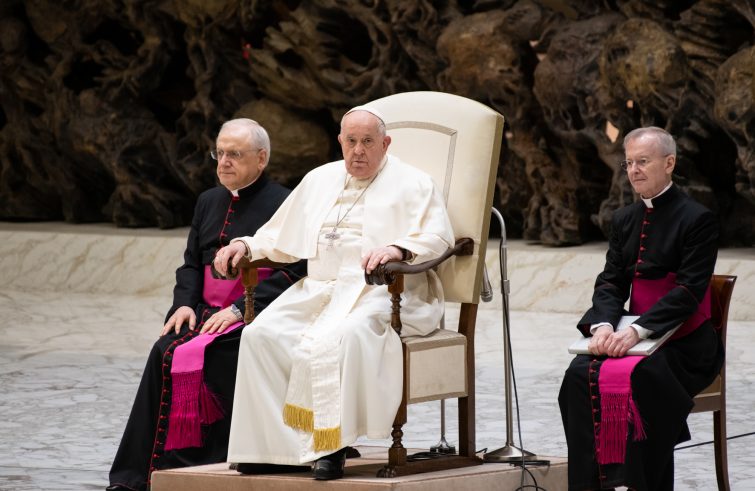
“I still have a bit of a cold, which is why I asked Monsignor Ciampanelli to read today’s catechesis”, Pope Francis said as he opened Wednesday’s general audience in Paul VI Hall that he entered on a wheelchair, instead of walking leaning on a cane, as has been the case during the weekly audiences. Before the General Audience, the Pope received the members of the Synod of Bishops of the Patriarchal Church of Cilicia of the Armenians. Monsignor Filippo Ciampanelli from the Secretariat of State read the text written for this occasion. It was the Pope’s second public appearance since he contracted a mild flu a few days ago, and as a precautionary measure all his scheduled engagements had been cancelled since Saturday, with the exception of the Angelus prayer last Sunday in St Peter’s Square. After his introductory remarks, the Holy Father resumed speaking only at the end of the catechesis – devoted to the two capital vices of envy and vainglory – to renew his appeal not to forget “not forget the peoples suffering because of war: Ukraine, Palestine, Israel and so many others.” “And let us pray for the victims of the recent attacks on places of worship in Burkina Faso; as well as for the people of Haiti, where crimes and kidnappings by armed gangs continue”, the Pope said. He reminded the faithful that March 1 will mark the 25th anniversary of the entry into force of the Convention on the Prohibition of Anti-Personnel Mines, “which continue to target civilians, innocent people, particularly children, many years after the end of hostilities.” I express my sympathy for the many victims of these insidious devices that remind us of the dramatic cruelty of wars, and the price civilian populations are forced to bear”, the Pope said, and thanked “all those who offer their contributions to assist the victims and clean up the contaminated areas: their work is a concrete response to the universal call to be peacemakers, taking care of our brothers and sisters.”
“Envy, if unchecked, leads to hatred of the other”,
reads the catechesis devoted to envy and vainglory, “two deadly vices” that “are characteristic of a person who aspires to be the centre of the world, free to exploit everything and everyone, the object of all praise and love.” “Envy is an evil that has not only been investigated in the Christian sphere: it has attracted the attention of philosophers and wise men of every culture”, Francis remarks: “At its basis is a relationship of hate and love: one desires the evil for the other, but secretly desires to be like him. The other is the epiphany of what we would like to be, and what we actually are not. His good fortune seems to us an injustice: surely, we think to ourselves, we would deserve his successes or good fortune much more!”. “At the root of this vice is a false idea of God: we do not accept that God has His own “math,” different from ours, the Pope explains: “We would like to impose our own selfish logic on God; instead, the logic of God is love. The good things He gives us are meant to be shared. This is why St. Paul exhorts Christians, “Love one another with brotherly affection; outdo one another in showing honor” (Rom 12:10). Here is the remedy for envy!”.
“Vainglory is an inflated and baseless self-esteem”,
Francis’ second portrayal: “The vainglorious person possesses an unwieldy ‘I’: he has no empathy and takes no notice of the fact that there are other people in the world besides him. His relationships are always instrumental, marked by the dominating the other. His person, his accomplishments, his achievements must be shown to everyone: he is a perpetual beggar for attention. And if at times his qualities are not recognized, he becomes fiercely angry. Others are unfair, they do not understand, they are not up to it.” “To heal the vainglorious, spiritual teachers do not suggest many remedies”, the Pope points out: For in the end, the evil of vanity has its remedy in itself: the praise the vainglorious man hopes to reap from the world will soon turn against him. And how many people, deluded by a false self-image, have then fallen into sins of which they would soon be ashamed!”. For Francis, “The finest instruction for overcoming vainglory can be found in the testimony of St. Paul”, who “always reckoned with a defect that he could never overcome”: “Three times he asked the Lord to deliver him from that torment, but finally Jesus answered him, “My grace is sufficient for you; for strength is fully manifested in weakness.” From that day Paul was set free. And his conclusion should also become ours: “I will therefore gladly boast of my weaknesses, that the power of Christ may dwell in me.”










